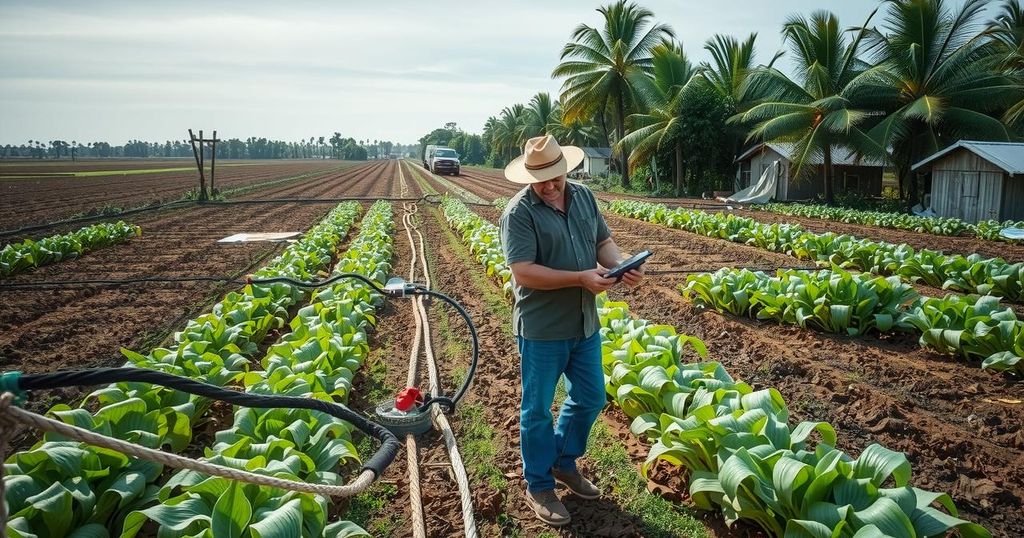Farmers Struggle to Recover from Hurricane Helene’s Devastation

Hurricane Helene severely impacted farmers across the South, especially in Georgia, resulting in estimated losses exceeding $10 billion. Farmers like Chris Hopkins faced significant crop damage during the fall harvesting season, with extensive losses reported across various states. The recovery process is projected to take years, necessitating federal and state assistance amid critical emotional and financial challenges for farmers.
Farmers are still grappling with the aftermath of Hurricane Helene, which struck the South in late September. Chris Hopkins, a farmer from Georgia, continues to deal with the devastation left on his land, including broken irrigation systems and lost crops. Helene made landfall as a catastrophic Category 4 hurricane, causing extensive damage throughout numerous states. Estimates suggest the financial impact on farming and agribusinesses could exceed $10 billion across affected areas from Florida to Virginia.
Particularly hard-hit were cotton growers like Hopkins. The storm wreaked havoc during the crucial fall harvest period, leading many farmers to prioritize salvage efforts rather than full-scale cleanup. Losses reported include approximately $5.5 billion in Georgia and $3.1 billion in North Carolina, with additional significant losses in surrounding states. Hopkins alone estimates that he lost 50% of his cotton crop, translating to an estimated $430,000 in losses, not including further expenses related to cleanup and equipment repair.
The storm’s destructive path extended beyond cotton, devastating pecan orchards and destroying poultry houses. Experts note the extent of damage might leave some farmers unable to recover. In response to the widespread crisis, Georgia’s government has redirected funds to provide emergency assistance, although state law restricts direct disaster aid. On a federal scale, a recent spending bill has allocated $21 billion for disaster recovery efforts impacting farmers nationwide.
The poultry industry also faced immense challenges, with Jeffrey Pridgen reporting significant losses from his chicken farming operations, stating that four of his poultry houses were destroyed. He anticipates rebuilding will take time, costing approximately $450,000 per new house while insurance coverage may only cover half of those expenses. The recovery period is expected to extend for at least two years.
Despite these adversities, experts believe that consumer prices will not experience significant increases, as agricultural production elsewhere can mitigate shortages, albeit with the exception of pecans, for which Georgia is a leading producer.
Hurricane Helene made landfall in late September and impacted a vast region of the South, wreaking havoc on farmland and agricultural infrastructure. As a major natural disaster, it has drawn attention to both the immediate and long-term consequences for farmers, their livelihoods, and the agricultural economy. The extent of damage includes not only crop losses but also destruction of equipment and facilities critical to agricultural operations, prompting many farmers to reconsider their futures in farming. Economic assessments indicate a serious financial toll on the agriculture sector, with the losses spanning multiple states, thus requiring a robust response from both state and federal government officials.
The devastation caused by Hurricane Helene has left farmers in Georgia and surrounding states facing significant losses and emotional distress. While efforts are underway to provide assistance, many farmers are left contemplating their futures amid overwhelming losses. The long-term impact of the disaster on agricultural production and livelihoods remains to be fully realized, yet a collective effort at the federal and state levels may provide some relief to those most affected.
Original Source: brookingsregister.com






